In 200 Words or Less
SEPTEMBER 2016
MAY 2016
A Note to Reinvigorate Spider-Man
The Quilt of Feminism
Entertaining, Informative, Honest
Rethinking Tourism at Famous Landmarks
APRIL 2016
On Genocide in Lord of the Rings
Aggressive, Passive, Assertive
Celebrity, Yoga and the Spiritual Meaning of Life
We, Cities
Only Read Firsthand Accounts of the Holocaust
MARCH 2016
May 2016
Narcissus and the Information Economy
There is more text produced in one hour than you could read in your life. There's a special beauty in the vastness of the ocean. But there's also that primal dread of being tiny. Here we are, in our little dingy, adrift on this ocean of information. We will go mad if we think about the depths below or that we will never see land. Psychologically, it's damaging to contemplate infinity, which is why we, as a species, have tethered ourselves to eternal truths and gods.
Our modern coping mechanism is an age of spectacular narcissim that keeps us staring at the water. We have a lot of information and, consequently, a culture of self-absorption to keep us consuming our own reflection; the product is us for us.

May 2016
A Note to Reinvigorate Spider-Man
To reinvigorate Spider-Man, the writers have to replace the hollow moral, "with great power comes great responsibility".
It fails to resonate because it's for an older generation that remembers America, turned outward, fighting proxy wars to 'rescue' the world from communism.
To make Spider-Man relevant we must turn inward. Uncle Ben must say, "when you do something cool, post a photo of it".
Later, Spider-Man can reflect on the deeper philosophical implications of the age of social media sharing:
"if people love me more when I wear a mask... who am I ?"
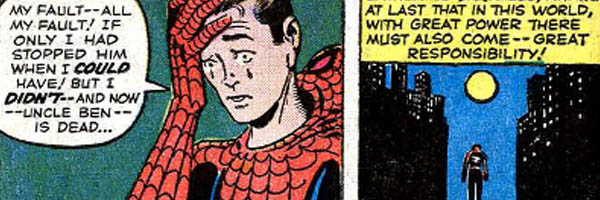
May 2016
The Quilt of Feminism
I teach feminist analysis to high school students and I used to revel in ridiculing Disney's The Little Mermaid. It's an easy target. Ariel lives in a box defined by men: escaping an old man to marry a young man on the advice of a crab man. She literally has no voice and cowers for her prince to save her in the climax. I would watch my deflated students trying to defend the movie. I no longer think that pulling the rug out from under young women is the best way to teach feminism.
Today, I try to place The Little Mermaid in a wider Quilt of Feminism. I still teach about the history of patriarchy but, instead of condemning examples of female representation, I ask how each character widens or narrows our expectations of women. The core idea being that there is space to enjoy damsels in distress so long as we have a full quilt of female role models. So my emphasis is not destructive criticism but positive creativity: what characters do we need to see to have a richer range of female role models?
I believe that Ann Coulter, the outspoken conservative anti-feminist and rat bastard, has contributed so much good by expanding the quilt of expectations for young women. She's a unique, female role model that accomplishes much more than all of the male high school teachers defining feminism.

May 2016
Entertaining, Informative, Honest
This is a tool I use to evaluate stories. These are three reasons why readers are drawn to stories. You have to do at least one of these three things very well.
Entertainment: does the story compel the audience to watch to the end?
Informative: does the story bring you inside of a new world, teaching you details?
Honest: does the story hold special relevance to the now, speaking a difficult truth (often from lived experience)?
Consider,
Serial television is exceptional at using entertaining cliffhangers (think Lost) but, like all mainstream media, prefers looking backward to what worked, endorsing faded cliches to relevant honesty.
Alien (1979) is very entertaining. We must watch the end to see how/if the alien will be stopped. The main character is crafted as a tough, kind underdog. It's quite informative, sharing lovingly crafted details. The aliens have their own detailed biology. The characters are working class miners in space, improvising weapons from their tools. The story stands above similar films with vague space military figures fighting a vague monster.
The Sun Also Rises (1926) is not very entertaining, a meandering tale of a road trip. But it brings the audience into the unique world of a vacation in Spain to see bullfighting. It's exceptionally honest, exposing the raw pain of a love triangle (the author's lived experience).
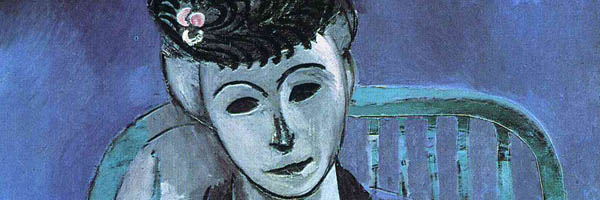
May 2016
Rethinking Tourism at Famous Landmarks
The fantasy sold to consumers is that travel is an individual experience. The dream is to stand alone on the Eiffel Tower or the Great Wall of China. Ultimate private property.
I visit these places often for my job. In truth, these sites are overflowing with tourists. The vibe is often polite but grudging, with everyone spoiling everyone else's photos. Tourists move alone in a crowd.
I'm struck by how often I am in these communities, surrounded by people who have embarked on the same pilgrimage, with so little connection. Moving forward, I encourage famous landmarks to create simple games/traditions for connecting strangers, emphasizing community, empathy, and positivity.
Consumer tourists have extreme anxiety about strangers. I think they will participate in interactions that are structured, short, and do not involve touching.
Examples:
- language exchange: you and a stranger teach each other to say, "When life is hard, remember that I, [name], from [place] believe in you"
- exchange a written letter with a secret to be saved and read once you return home
- landmarks often have famous photos, like holding up the Tower of Pisa. Landmarks can post new traditions of team photos to take with strangers
- a map where strangers add their homes
- a zone where you bring and swap a cheap, pocket knickknack from your country with a stranger
People from all over the world visit these landmarks. That is the beauty.
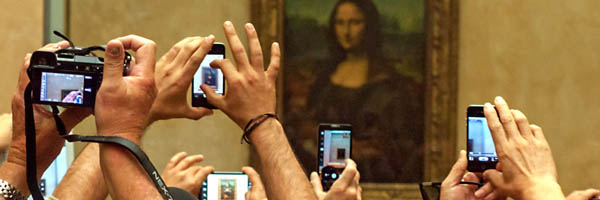
APRIL 2016
On Genocide in Lord of the Rings
The darkest, saddest, most evil conclusion that we can draw is to have complete confidence that someone you know nothing about deserves to be killed. This is us and our children when we watch The Lord of the Rings.
LOTR is the most popular, though not only, fantasy novel that organizes people into races (elves, humans, orcs, etc). Race is an idea from fake science that divides people into categories/races with fixed, "biological" characteristics. Racism provides the feeling that we know an individual's potential, strengths, and limits without knowing them.
In LOTR, the orcs and trolls are a villainous, evil race. As racists, we accept their biological destiny. We don't believe, nor look for evidence, that they can choose to be anything other than evil. No "hero" in LOTR takes prisoners. Why would they? There is no redemption for orcs. So, we find ourselves cheering for murders on the basis of race. Genocide.
This is in stark contrast to modern villains, particularly in children's films, where the villain's evil is revealed to be a CHOICE and not a biological destiny.

APRIL 2016
Aggressive, Passive, Assertive
We all have needs. How we communicate our needs can be passive, aggressive, or assertive. Passive style is pretending you have no needs. Aggressive style is telling others what they must do to meet your needs. Assertive style is stating your needs and giving space.
This is a useful tool to understand yourself and, as a writer, how to craft distinct, consistent characters. Let's practice by crafting "the need to stop and eat" in three voices:
Passive: There's so many good places to eat here. I'm good to keep working or do lunch. (Camouflage those needs! Proceed with worry that your needs will be discovered. Avoid reactions.)
Aggressive: You're working too much. Don't you know it's time to break for lunch? (emphasize "you". Blame. Make bold assumptions, if it's obvious to you then everyone knows it. Control reactions.)
Assertive: I'm hungry and I think it's starting to hit my mood. I gotta eat.(Use 'I'. Self-reflect. Give others the space to react how they will)
As a sidenote, "passive aggressive" means someone who is pretending not to have needs but trying to tell you exactly what you must do. Something like, "there are so many good restaurants, you should get a lunch menu for yourself. See if you want to eat there."
---
Additional practice. Which is aggressive, assertive, passive? The "need" to give a compliment that someone is attractive:
You're pretty. You know it. Move your hair. There, you're sexy.
I find you beautiful. I don't understand it but I feel my heart move when I see you.
Some people really are good looking, you know? I mean, I don't notice that stuff.

APRIL 2016
Celebrity, Yoga and the Spiritual Meaning of Life
What is spirituality? That human longing to be a part of something bigger than ourselves.
Our capitalist-consumer civilization is spirituality vapid because we value constant change. The young are encouraged to from new brand identities. We have nothing eternal and only disdain for the old way. Timeless truth is at a low while the pressure to be productive is peaking, hence a culture of great anxiety without meaning. We cannot buy everlasting.
Consider the pilgrimage of North American women to India to practice yoga. Yoga provides spiritual escapism. It alleviates anxiety because it's exercise and allows consumers to project their desperation for the eternal onto a product, seeking to buy their way into the commodity of ancient wisdom.
Consider too, how people share stories about celebrity sightings. Even rational friends delight in spotting a saint. Celebrities are our holy people connected to the only grand meaning we have: mass media. Unfortunately, these are unsatisfying gods. They have breadth but not depth. Everyone knows who they are but not in twenty years.
Listen to our youth. They all say, "I want a meaningful job". An empty quest. There is no long-term meaning inside of capitalism.

APRIL 2016
We, Cities
Last night, a stranger walked past, absorbed by the glow of his smartphone. How nice, I thought, he's with his friends; he carries his community in his pocket. How cozy, the fullest expression of urbanization. We are walking cities.
A fascinating experiment began in the late 1700s, when industrialization pushed the population from farms to factories. What happens when you take the human animal, whose brain can recognize a few hundred people, and surround it with millions of strangers? Suspicion, anxiety, and alienation. This was life in the city. Opportunity at the cost of community.
Consider, you can only care about 300 people. Where are they?
Today, each of us has internalized the curse of the city. Technology has moved us once more; our communities have become non-geographic. What are the names of your ten closest neighbours? The people in our immediate vicinity are total strangers. The 300 people we can care about are elsewhere, connected online. This is not a criticism, only an observation about our era's our contribution to human history: urbanization's wildest dream fulfilled. We are all cities.

APRIL 2016
Only Read Firsthand Accounts of the Holocaust
"If you ask me what I want to achieve, it's to create an awareness, which is already the beginning of teaching."
-Elie Wiesel (1978)
I teach high school students who have never heard of the Holocaust. Teachers pick one genocide unit, often settling on Rwanda, 1994. Modern understanding of the Nazi concentration camps comes from Schindler's List (1993), Life is Beautiful (1997), and The Boy in the Striped Pyjamas (2008).
Individually, these stories are entertaining. Together, they are a disgraceful, collective lie. The narratives are constructed to feed our optimism and arrogance. Reject this fiction of heroism. Only read firsthand accounts of the Holocaust. Read Wiesel's Night. It is not an uplifting story. It is industrialized murder, trauma, and indifference to suffering.
Wiesel returns from abuse and shame to report the truth. Everything in him and us is screaming no, stay silent, we do not want to look at it. Tell a nicer story.
I remember the Holocaust Memorial Museum in Washington. The first thing I saw was a TV with black and white footage playing on loop. A Nazi solider shoots a civilian in the head and his corpse rolls into a mass grave. That's the only movie about the Holocaust.
Eleven million people were murdered. You're gonna watch a tale of rescue? You may as well use the gas chambers as a backdrop for a rom com.
Only read firsthand accounts of the Holocaust. The truth is traumatic. Don't sanitize it. Struggle with it. Resist the urge to bring artificial light into the darkness.
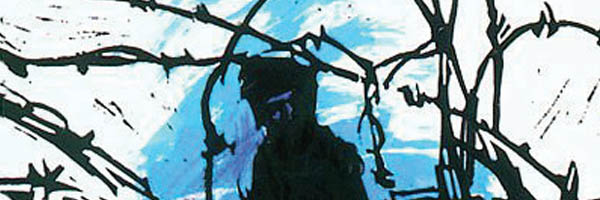
MARCH 2016
Placing Canadian Comedy Between American and British
Let's place Canadian comedy between American and British stlyes.
The British sense of humour is sophisticated and dark. They prize wordplay, subtlety, and irony because they love layers of meaning. After all, a great joke is measured by the time it takes to get it (and a few casualties will miss it altogether). A dark ending is essential so that cynics can relive the fall of the British Empire. The pinnancle of British comedy is an innocent family being executed because of a typo and a cowardly bureaucrat covering it up to save their job.
The American sense of humour is crass and celebatory. They favour big characters and being loud because they love having everyone in on the joke. American comedy is obvious, physical and grotesque, dealing with all of our favourite orifices. A happy ending is a must. The pinnacle of American comedy is a Big Lug farting so loud that it leads to a happy marriage and rescues the auto industry.
Canadian comedy hits a sweet spot, borrowing a sense of tragedy from the British while struggling to be as welcoming as the Americans. It is part physical and part clever. We shy away from saying fart and would never use malapropism or a big word like malapropism. Endings can be sad but you've gained a friend in a cute dog.
As a sidenote, the ruthless Aussies will laugh themselves silly screaming insults at a toad as it is mulched by a lawnmower.
MARCH 2016
Totalitarianism
Totalitarianism is a fancy word for a system of total control. Imagine a government that wants to influence every part of your life: the books on your shelf, the files on your device, the conversations with your friends -even the thoughts in your head.
Perfect loyalty is impossible so we're all guilty, living in constant fear of arrest and execution, suspicious and hateful of neighbours. From the 1930s to the 1990s, our culture lived in fear of this system. Our books and movies expressed criticism and hatred of the totalitarian villains: The Soviet Union (Stalin), Nazi Germany (Hitler), and Communist China (Mao).
The villains are gone. Now, in 2016, our culture arrived at totalitarianism from a different direction: consumer individualism. Our devices report our locations, our writing is archived by others, and "cookies" track that you're reading this right now. Corporations pay for this information to improve marketing. Our government wants access to improve policing.
We censor ourselves. We live with awareness that we're being tracked, recorded, and profiled. These services are not free. We pay with our privacy. These are dangerous tools in a peaceful time. But not all times are peaceful.

MARCH 2016
Rape Jokes
In 2012, a rape joke controversy was simpified into the question, "is rape appropriate for comedy?" Yes. Everything is. A better question is, "how is rape is used to get laughs?" This would have revealed the current battle in our culture, as we transition from rape as an intellectual concept to rape as an emotional concept. Both sides feel offended when rape jokes do not enforce their perspective.
rape is an abstraction, a big idea that cannot be one-upped
VS
rape is an experience, a tragedy
Consider these jokes by Daniel Tosh:
"I play practical jokes on my sister. I replaced her pepper spray with silly string. Anyway, that night she got raped. She called me saying, you got me!"
“Wouldn’t it be funny if that girl got raped by like, five guys right now… like right now?”
Here, comedy comes from exaggeration, presenting rape as a creative choice for the final beat in a joke. So often in comedy, the comedian searches for the top of the premise. Example: door number one is forgetting an umbrella, door number two is forgetting your phone charger, door number three is you get raped. This perspective lands with audiences who consider rape to be a funny concept, the last, extreme iteration in a classic joke structure.
Consider these Sarah Silverman jokes:
"Who's going to complain about a rape joke? Rape victims? They're traditionally not complainers."
"I was raped by a doctor... which is so bittersweet for a Jewish girl."
The comedy comes from understatement, presenting rape as trauma. Example: No one in the media asked the important question after those high school football players raped that girl... did they win? This perspective lands with audiences who understand rape as personal, intense, sacred, and misunderstood/neglected by mainstream media.
This is a small example in a larger trend. The insights of feminism and postcolonialism have opened our culture's eyes, added voices to the conversation, and moved our comedy from abstraction to lived.

MARCH 2016
I Never Get Emotional is an Extremely Emotional Thing to Say
A weeping crybaby, blubbering through tears is clearly emotional. But so too is a calm, stone-faced adult, speaking in a measured voice, "let's be rational. You always do this."
Consider that emotional means "thinking in extremes". Yes, red faces and tears are a good indication of intense feelings but our faces can hide our thoughts. Intense emotion lives in language like: "you never...", "this always happens", "this is the worst", "they're the best", etc.
"I am logical. I never get emotional," is an extremely emotional thing to say.
I came across similar thinking when reading literature about living with grief. We often remember our loved ones as total saints or sinners. I was rereading George W. Bush's Axis of Evil speech (2002). This is a prime example of intense emotion masquerading as rational: "our first priority must ALWAYS be the security of our nation" and "the price of freedom and security is high, it is NEVER too high."
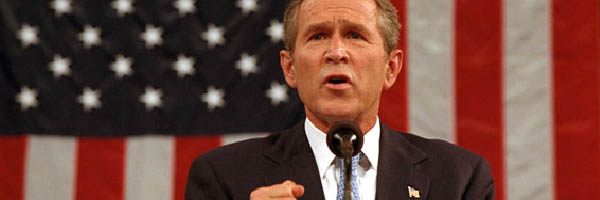
MARCH 2016
The Legacy of The Revenant
The legacy of The Revenant is twofold. First, it will have started the trend of actors looking directly at the camera in the final shot, pleading for an Oscar with their eyes. Second, it will be remembered as the moment America's love of violence became pathological. The film went to extraordinary length to present itself as authentic. It was shot on chilly mornings and based on the story of Hugh Glass (1783-1833).
The film's pretensions of authenticity are best expressed by the scene in which we watch a pack of CGI wolves attack a CGI buffalo. Why did this hilarious fact not prevent the film promoting itself as Truth? We are primed to lie to ourselves.
On screen, Glass is left for dead after a bear attack, watches Fitzgerald murder his son, and survives to get revenge. In history, Glass was left for dead after a bear attack, no son, and survived to forgive Fitzgerald.
An extraordinary story of survival and forgiveness was rewritten as a tale of satisfying, justified revenge. We're watching a nation that has grown accustomed to lying to itself to justify violence. They invaded Iraq but there were no weapons of mass destruction. Look no further than The Revenant to understand why drone strikes are justified without public discussion and why they fail to make sense of school shootings.
